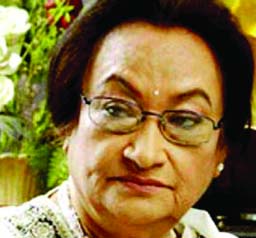
Legendary Nazrul Sangeet maestro Firoza Begum passed away on Tuesday night at a city hospital at the age of 83.She breathed her last at 8:30pm at Apollo Hospitals in Dhaka. Earlier, on Friday, she was admitted into the hospital with various complications, including heart and kidney problems. On Monday, Firoza was shifted to the Intensive Care Unit (ICU) of the hospital as her condition deteriorated.The doctors told earlier in the evening, Firoza Begum’s heart and kidney were malfunctioning as well as her body was caught by jaundice. Firoza Begum was born in an aristocratic Muslim family in Faridpur district on July 28, 1930. Her father Khan Bahadur Mohammad Ismail and mother Begum Kaokabunnesa. Firoza Begum was married to Kamal Dasgupta who was a renowned singer, Nazrul song composer and music director.Among her three sons Hamin Ahmed and Shafin Ahmed are also musicians. They are currently the members of rock band Miles.Firoza Begum will be laid to rest at Banani graveyard after her Namaz-e-janaza at Banani Central Mosque after Asr prayer.Before this, her body will be taken to Indira road resident. Her body will also be taken to Central Shaheed Minar at 2pm where people from all walks of life will pay tribute to her. President Abdul Hamid and Prime Minister Sheikh Hasina expressed deep shock at the death of the prominent Nazrul Sangeet singer.In separate messages, they prayed for salvation of the departed soul and expressed their deep sympathy to the bereaved family members.Firoza Begum is the most popular Bangladeshi Nazrul Sangeet singer who popularized this genre of music not just in Bangladesh, but also in the whole South-East Asia. She became drawn to music in her childhood. This passionate Nazrul Sangeet singer started her career recording an Islamic song (Morur Buke Jibondhara Ke Bohalo) by a gramophone company in 1942 when she was only 12 years old. She lived in Kolkata from 1954 until she moved to Dhaka in 1967.In recognition of her contribution, Firoza Begum was honoured with the ‘Independence Day Award’ in 1979 and the ‘Sheltech Award’ in 2000

